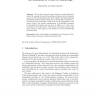Free Online Productivity Tools
i2Speak
i2Symbol
i2OCR
iTex2Img
iWeb2Print
iWeb2Shot
i2Type
iPdf2Split
iPdf2Merge
i2Bopomofo
i2Arabic
i2Style
i2Image
i2PDF
iLatex2Rtf
Sci2ools
103
click to vote
ECCC
2006
2006
On Probabilistic versus Deterministic Provers in the Definition of Proofs Of Knowledge
Abstract. This article points out a gap between two natural formulations of the concept of a proof of knowledge, and shows that in all natural cases (e.g., NP-statements) this gap can be bridged. The aforementioned formulations differ by whether they refer to (all possible) probabilistic or deterministic prover strategies. Unlike in the rest of cryptography, in the current context, the obvious transformation of probabilistic strategies to deterministic strategies does not seem to suffice per se. The source of trouble is "bad interaction" between the expectation operator and other operators, which appear in the definition of a proof of knowledge (reviewed here).
| Added | 12 Dec 2010 |
| Updated | 12 Dec 2010 |
| Type | Journal |
| Year | 2006 |
| Where | ECCC |
| Authors | Mihir Bellare, Oded Goldreich |
Comments (0)

